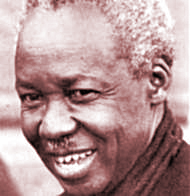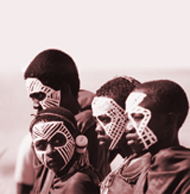
5 CENT COIN - TANZANIA - JULIUS KAMBARAGE NYERERE
(KM 1)
Date: A.D. 1974
Obverse: Portrait head left - TANZANIA 1974 RAIS WA KWANZA
Reverse: Sailfish jumping to left - SENTI TANO 5 (Tano is FIVE in Swahili)
Engraver: Christopher Ironside
|
The United Republic of Tanzania is a country on the east coast of Africa. Held by Germany and then Britain. It gained its independence in 1961 and became the Tanzanian Republic it is today in 1964. Tanzania is a beautiful country with a mountainous region in the north which is home to mount Kilimanjaro, Africa's highest peak, and in the north west is Lake Victoria, Africa's Largest Lake and the Island of Zanzibar is off its shore. Tanzania has a wide variety of wild life and is home to much of the great Serengeti plains with its herds wildebeests and all the animals that this brings to feed. It is a highly agricultural country with a highly diverse population with more than 150 ethnic groups, many of which have warred with each other as Tanzania has warred with other nations like Uganda who, under Idi Amin, attempted and failed to annex much of the northern areas. Possibly the best known political figure in Tanzania is its first president Julius Nyerere. Universally thought of as the founding father of Tanzania. A well educated well meaning teacher he saw a connection between socialism and tribal communal living. Although his policies often failed, it could not be said of him that he was not acting in what he thought was the best interests of his nation. Saying that he was a schoolmaster by choice and a politician by accident he sought to unite the many tribes and garner support for a move to independence. His efforts paid off and he was soon elected the first president of Tanzania (Rais wa Kwanza). A great believer in Traditional African communal living his attempt to merge socialism with tribalism was largely a failure. On his voluntary retirement in 1985 he made a rare and frank admission 'lets face it, I failed'. He would continue to be active after his retirement traveling the country and as an advocate for peace in Africa until his death in London from leukemia in 1999. |


